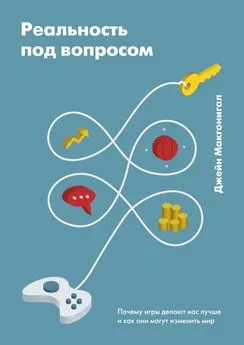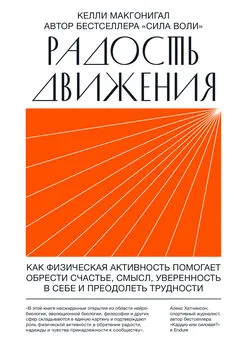Джейн Макгонигал - SuperBetter
- Название:SuperBetter
- Автор:
- Жанр:
- Издательство:Манн, Иванов и Фербер
- Год:2018
- Город:Москва
- ISBN:9785001174301
- Рейтинг:
- Избранное:Добавить в избранное
-
Отзывы:
-
Ваша оценка:
Джейн Макгонигал - SuperBetter краткое содержание
Книга будет интересна всем, кто готов освоить игровой подход для решения повседневных задач.
SuperBetter - читать онлайн бесплатно полную версию (весь текст целиком)
Интервал:
Закладка:
119
Rani A. Desai et al. Video-Gaming Among High School Students: Health Correlates, Gender Differences, and Problematic Gaming // Pediatrics. 2010. № 126 (6). e1414–e1424; Paul J. C. Adachi, Teena Willoughby . More Than Just Fun and Games: The Longitudinal Relationships Between Strategic Video Games, Self-Reported Problem Solving Skills, and Academic Grades // Journal of Youth and Adolescence. 2013. № 42 (7). P. 1041–1052.
120
Rosalina Richards et al. Adolescent Screen Time and Attachment to Parents and Peers // Archives of Pediatrics and Adolescent Medicine. 2010. № 164 (3). P. 258–262; Shao-Kang Lo, Chih-Chien Wang, Wenchang Fang . Physical Interpersonal Relationships and Social Anxiety Among Online Game Players // Cyber Psychology and Behavior. 2005. № 8 (1). P. 15–20.
121
Sarah M. Coyne et al. Game on… Girls: Associations Between Co-Playing Video Games and Adolescent Behavioral and Family Outcomes // Journal of Adolescent Health. 2011. № 49 (2). P. 160–165.
122
Julia Kneer, Sabine Glock . Escaping in Digital Games: The Relationship Between Playing Motives and Addictive Tendencies in Males // Computers in Human Behavior. 2013. № 29 (4). P. 1415–1420.
123
Joseph Benjamin Hilgard, Christopher R. Engelhardt, Bruce D. Bartholow . Individual Differences in Motives, Preferences, and Pathology in Video Games // Frontiers in Psychology. 2013. № 4. 608 p.
124
Andrew K. Przybylski, C. Scott Rigby, Richard M. Ryan . A Motivational Model of Video Game Engagement // Review of General Psychology. 2010. № 14 (2). 154 p.
125
Andrew K. Przybylski et al. Having to Versus Wanting to Play: Background and Consequences of Harmonious Versus Obsessive Engagement in Video Games // Cyber Psychology and Behavior. 2009. № 12 (5). P. 485–492.
126
Frode Stenseng, Jostein Rise, Pål Kraft . Activity Engagement as Escape from Self: The Role of Self-Suppression and Self-Expansion // Leisure Sciences. 2012. № 34 (1). P. 19–38.
127
Frode Stenseng, Jostein Rise, Pål Kraft. The Dark Side of Leisure: Obsessive Passion and Its Covariates and Outcomes // Leisure Studies. 2011. № 30 (1). P. 49–62; Frode Stenseng . The Two Faces of Leisure Activity Engagement: Harmonious and Obsessive Passion in Relation to Intrapersonal Conflict and Life Domain Outcomes // Leisure Sciences. 2008. № 30 (5). P. 465–481.
128
Слово «проактивный» было впервые введено автором логотерапии Виктором Франклом для обозначения личности, принимающей ответственность за себя и свою жизнь, а не перекладывающей ее на окружающих людей и обстоятельства.
129
Isabela Granic, Adam Lobel, Rutger C. M. E. Engels . The Benefits of Playing Video Games // American Psychologist. 2014. № 69 (1). P. 66–78.
130
Matthew W. G. Dye, C. Shawn Green, Daphne Bavelier . Increasing Speed of Processing with Action Video Games // Current Directions in Psychological Science. 2009. № 18 (6). P. 321–326; C. Shawn Green, Alexandre Pouget, Daphne Bavelier . Improved Probabilistic Inference as a General Learning Mechanism with Action Video Games // Current Biology. 2010. № 20 (17). P. 1573–1579; Bjorn Hubert Wallander, C. Shawn Green, Daphne Bavelier . Stretching the Limits of Visual Attention: The Case of Action Video Games // Wiley Interdisciplinary Reviews: Cognitive Science. 2011. № 2 (2). P. 222–230; Daphne Bavelier et al. Brain Plasticity Through the Life Span: Learning to Learn and Action Video Games // Annual Review of Neuroscience. 2012. № 35. P. 391–416; C. Shawn Green et al. The Effect of Action Video Game Experience on Task — Switching // Computers in Human Behavior. 2012. № 28 (3). P. 984–994; Jyoti Mishra et al. Neural Basis of Superior Performance of Action Videogame Players in an Attention-Demanding Task // Journal of Neuroscience. 2011. № 31 (3). P. 992–998.
131
Constance Steinkuehler, Sean Duncan . Scientific Habits of Mind in Virtual Worlds // Journal of Science Education and Technology. 2008. № 17 (6). P. 530–543; Tsung-Yen Chuang, WeiFan Chen . Effect of Computer-Based Video Games on Children: An Experimental Study // First IEEE International Workshop on Digital Game and Intelligent Toy Enhanced Learning, DIGITEL’07 (IEEE, 2007); Paul J. C. Adachi, Teena Willoughby . More Than Just Fun and Games: The Longitudinal Relationships Between Strategic Video Games, Self-Reported Problem Solving Skills, and Academic Grades // Journal of Youth and Adolescence. 2013. № 42 (7). P. 1041–1052.
132
Linda A. Jackson, Edward A. Witt, and Ivan Alexander Games . Videogame Playing and Creativity: Findings from the Children and Technology Project // National Social Science Proceedings. 2011. Vol. 47. Seattle Summer Seminar; Linda A. Jackson . The Upside of Videogame Playing // Games for Health: Research, Development, and Clinical Applications. 2012. № 1 (6). P. 452–455.
133
A Consensus on the Brain Training Industry from the Scientific Community. Max Planck Institute for Human Development and Stanford Center on Longevity. 2014. October 20, http://longevity3.stanford.edu/blog/2014/10/15/the-consensus-on-the-brain-training-industry-from-the-scientific-community.
134
Valerie Shute, Matthew Ventura, Fengfeng Ke . The Power of Play: The Effects of Portal 2 and Lumosity on Cognitive and Noncognitive Skills // Computers and Education. 2014. № 80. P. 58–67; Laura A. Whitlock, Anne Collins Mclaughlin, Jason C. Allaire . Individual Differences in Response to Cognitive Training: Using a Multi-Modal, Attentionally Demanding Game-Based Intervention for Older Adults // Computers in Human Behavior. 2012. № 28 (4). P. 1091–1096.
135
Andrew K. Przybylski, C. Scott Rigby, Richard M. Ryan . A Motivational Model of Video Game Engagement // Review of General Psychology. 2010. № 14 (2). 154 p.; Christopher Bateman . Top Ten Emotions of Videogames — Results of the DGD2 Global Survey // Only a Game. 2008; Niklas Ravaja et al. The Psychophysiology of Video Gaming: Phasic Emotional Responses to Game Events / in Authors Digital Games and Nicolas Esposito, eds., Proceedings of DIGRA 2005 Conference: Changing Views — Worlds in Play. 2005.
136
Cheryl K. Olson. Children’s Motivations for Video Game Play in the Context of Normal Development // Review of General Psychology. 2010. № 14 (2). 180 p.; Christopher J. Ferguson, Cheryl K. Olson . Friends, Fun, Frustration and Fantasy: Child Motivations for Video Game Play // Motivation and Emotion. 2013. № 37 (1). P. 154–164; Jeroen Jansz . The Emotional Appeal of Violent Video Games for Adolescent Males // Communication Theory. 2005. № 15 (3). P. 219–241.
137
Jayne Gackenbach, Beena Kuruvilla, Raelyne Dopko . Video Game Play and Dream Bizarreness // Dreaming. 2009. № 19 (4). 218 p.; Jayne Gackenbach. Electronic Media and Lucid-Control Dreams: Morning After Reports // Dreaming. 2009. № 19 (1). 1 p.; Jayne Gackenbach, Beena Kuruvilla . The Relationship Between Video Game Play and Threat Simulation Dreams // Dreaming. 2008. № 18 (4). 236 p.; Jayne Gackenbach. Video Game Play and Lucid Dreams: Implications for the Development of Consciousness // Dreaming. 2006. № 16 (2). 96 p.
138
David R. Ewoldsen et al. Effect of Playing Violent Video Games Cooperatively or Competitively on Subsequent Cooperative Behavior // Cyberpsychology, Behavior, and Social Networking. 2012. № 15 (5). P. 277–280; John A. Velez et al. Ingroup Versus Outgroup Conflict in the Context of Violent Video Game Play: The Effect of Cooperation on Increased Helping and Decreased Aggression // Communication Research. 2012; Tobias Greitemeyer, Christopher Cox . There’s No ‘I’ in Team: Effects of Cooperative Video Games on Cooperative Behavior // European Journal of Social Psychology. 2013. № 43 (3). P. 224–228; Tobias Greitemeyer. Playing Video Games Cooperatively Increases Empathic Concern // Social Psychology. 2013. № 44 (6). 408 p.; Jessica M. Jerabeck, Christopher J. Ferguson. The Influence of Solitary and Cooperative Violent Video Game Play on Aggressive and Prosocial Behavior // Computers in Human Behavior. 2013. № 29 (6). P. 2573–2578.
139
Christopher J. Ferguson, Adolfo Garza . Call of (Civic) Duty: Action Games and Civic Behavior in a Large Sample of Youth // Computers in Human Behavior. 2011. № 27 (2). P. 770–775; Nicolas Ducheneaut, Robert J. Moore . More Than Just ‘XP’: Learning Social Skills in Massively Multiplayer Online Games // Interactive Technology and Smart Education. 2005. № 2 (2). P. 89–100; Timothy C. Lisk, Ugur T. Kaplancali, Ronald E. Riggio . Leadership in Multiplayer Online Gaming Environments // Simulation and Gaming. 2012. № 43 (1). P. 133–149.
140
Criminal Case — уголовное дело (англ.).
141
Steven C. Hayes et al. Measuring Experiential Avoidance: A Preliminary Test of a Working Model // Psychological Record. 2004. № 54 (4); Todd B. Kashdan et al. Experiential Avoidance as a Generalized Psychological Vulnerability: Comparisons with Coping and Emotion Regulation Strategies // Behaviour Research and Therapy. 2006. № 44 (9). P. 1301–1320; Jonathan W. Kanter, David E. Baruch, Scott T. Gaynor . Acceptance and Commitment Therapy and Behavioral Activation for the Treatment of Depression: Description and Comparison // Behavior Analyst. 2006. № 29 (2). 161 p.
142
Недавно вышедшая статья Andrew K. Przybylski . Electronic Gaming and Psychosocial Adjustment // Pediatrics. 2014. August 4, doi: 10.1542/peds.2013–4021.
143
Zaheer Hussain, Mark D. Griffiths . Excessive Use of Massively Multi-Player Online RolePlaying Games: A Pilot Study // International Journal of Mental Health and Addiction. 2009. № 7 (4). P. 563–571.
144
Daniel King, Paul Delfabbro . Motivational Differences in Problem Video Game Play // Journal of Cybertherapy and Rehabilitation (JCR). 2009. № 2 (2).
145
TED (Technology. Entertainment. Design) — частный некоммерческий фонд в США, миссия интеллектуальных конференций которого состоит в распространении уникальных идей. Избранные лекции доступны на сайте конференции.
146
Соответствует оценке «три» по пятибалльной системе.
Читать дальшеИнтервал:
Закладка:








